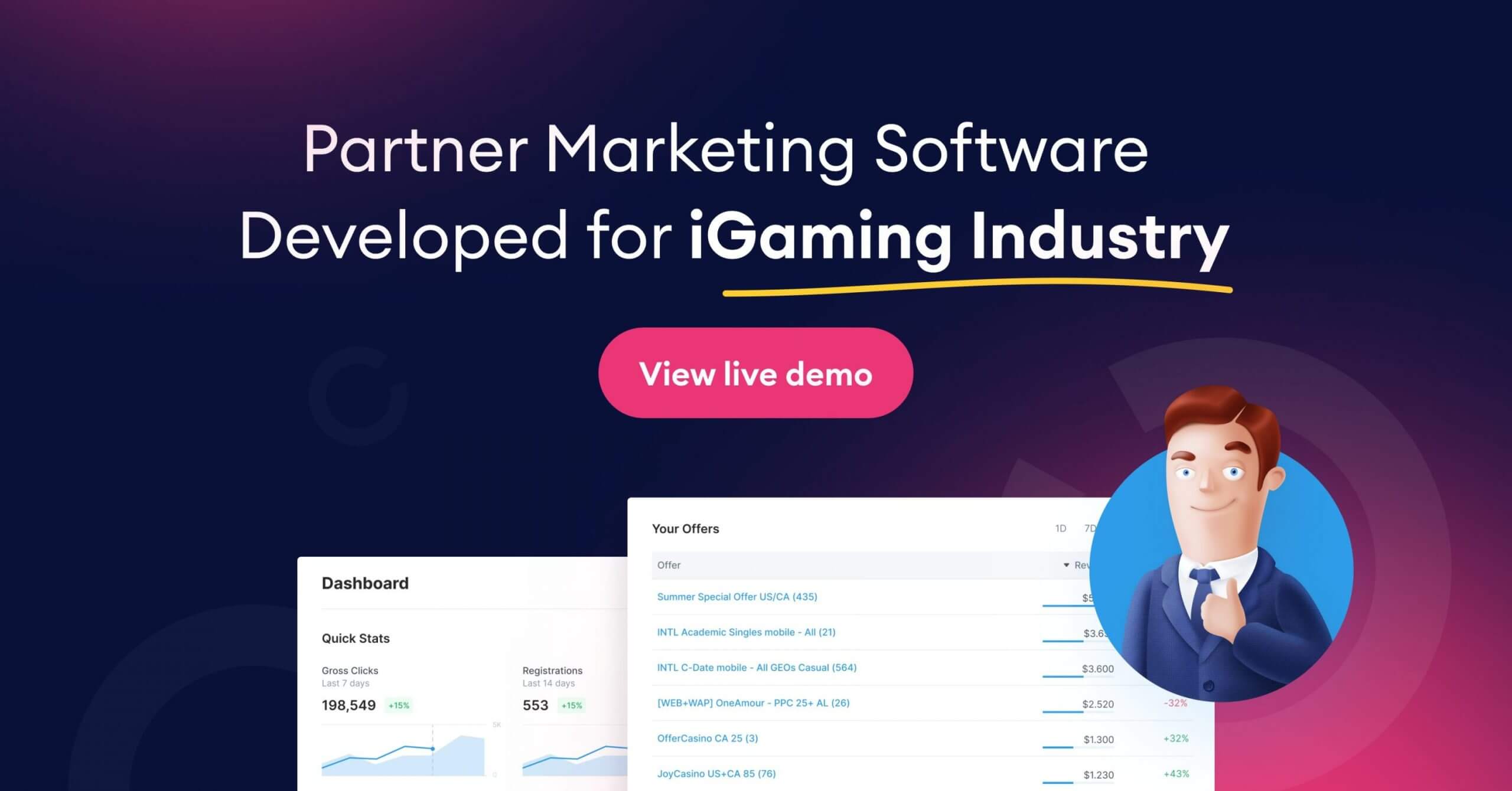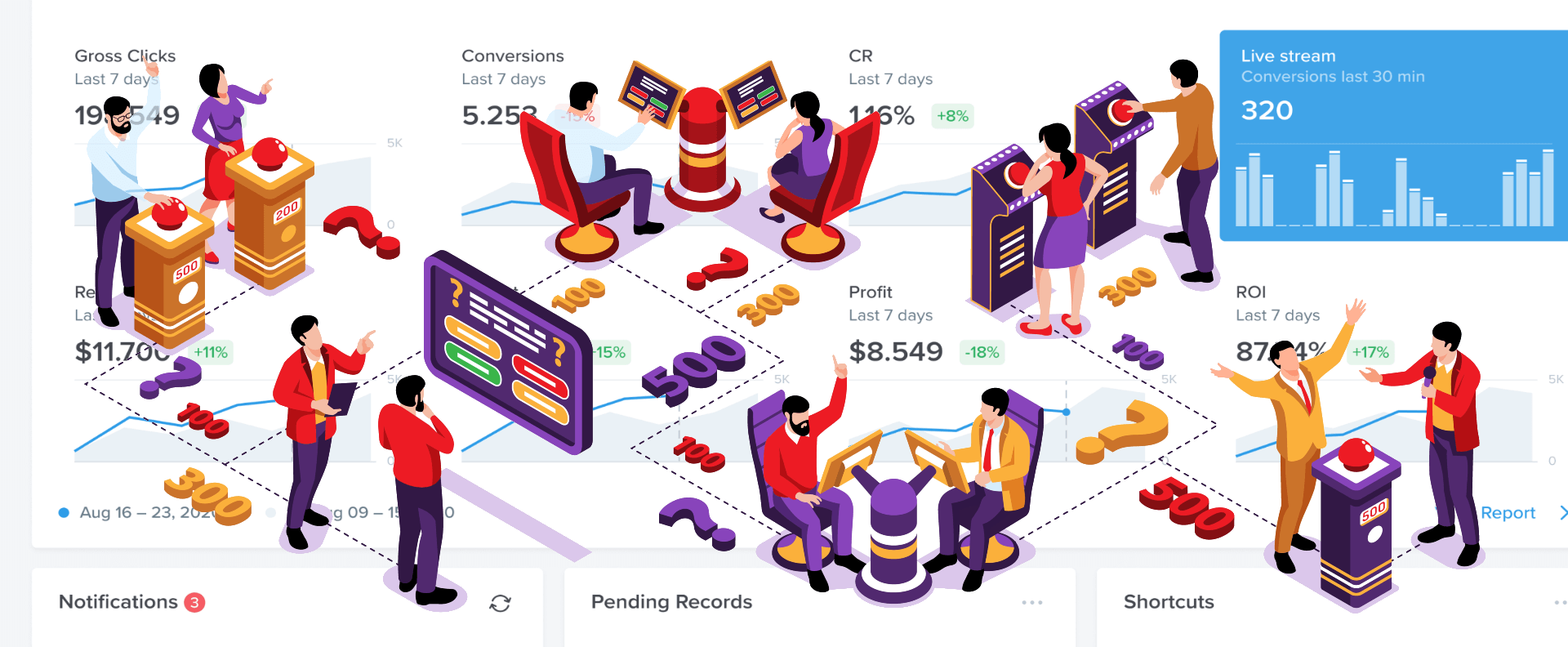How much should you pay your iGaming affiliates? The commissions are arguably the most motivating factor for your current and future affiliates.
Affiliate payouts form the basis of affiliate programs, so creating conditions acceptable to all parties involved in the affiliate program can be difficult.
A commission rate must attract affiliates while also incentivizing existing ones to attract new players and, ideally, new partners. Meanwhile, your partner program’s expenses should not exceed your revenue.
How do we find the golden middle?
Don’t worry. Continue reading to learn how to set attractive yet affordable affiliate commission rates and increase your project’s exposure.

Jump to 👉 How much are other iGaming / Casino websites paying their affiliates?
Types of Affiliate Commission Rates and Terms Commonly Used in iGaming
Let’s first discuss the various commission scenarios. Affiliates are “hired” by businesses worldwide to drive traffic to their online gaming brands via referral links. Roughly speaking, affiliate marketing commissions are, therefore, used to compensate for such services.
The reward varies depending on the commission model agreed upon by the affiliate and the operator. The following are the most common types in the iGaming industry:
CPA
Cost per acquisition or action is a commission type in which the remuneration occurs when the visitor performs a specific action in the casino, sportsbook, or poker site, such as making a deposit, wagering a certain amount of money, or performing another per-arranged action.
Affiliates must meet certain criteria in order to receive the reward.
Unlike CPA, affiliates in RevShare receive commissions as long as the referred customers continue to bring revenue to the business, whether it is a casino or a sportsbook. These commissions are typically a percentage of the revenue. This model is considered long-term because there is usually no time limit and affiliates receive their rewards throughout the entire player lifecycle.
Hybrid
This type combines CPA and Revenue Share. First, the affiliate is compensated for bringing the player, and then they receive ongoing long-term rewards as a percentage of the revenue generated by the aforementioned player.
Pay Per Click (PPC)
The payment in Pay per Click (PPC) and Cost per Click (CPC) is linked to the number of clicks that lead from the partner website to the operator. The higher the fee, the more clicks are made. Google’s Ads (formerly Adwords) program is an excellent example.
Pay Per Lead
The CPL commission (also known as Pay per Lead or simply PPL) compensates affiliates for the contact information of an already interested customer. The commission is primarily paid if the player creates an account on the website.
Per Per Impression
This commission type is mostly found on niche websites that cater to a specific audience and affiliates are paid a fixed amount per 1000 impressions, which means once the ad was viewed 1000 times.
Read our article on the 9 types of affiliate marketing commissions to learn more.
Standards for Determining a Player’s Worth
Determining the best affiliate commission rates and terms takes time and effort. That is why we have compiled some advice and reference points to assist you in determining how much you should pay.
Primary commission structure
There’s no reason to limit yourself to just one type of commission when your partner program may offer several at the same time. And, while each of your affiliates can have a commission plan that is unique to them, you must establish a basic commission structure that your potential affiliates will see.
Set an average affiliate commission rate that appeals to partners and encourages them to increase traffic. However, it must be reasonably priced for your company in order for you to make payments on time.
Simultaneously, be open to revising the conditions for your partners. Motivate them to drive higher-quality traffic by offering the opportunity to improve the commission plan terms.
When developing your standard plans, consider how you will handle negative carryover – when the player your affiliate introduced wins more money than he or she loses. In some affiliate programs, the negative carryover continues into the following month, and some operators reset the carryover after a set period of time.
Keep in mind that having a negative carryover policy can discourage affiliates from working with you. That’s why many modern affiliate programs don’t allow negative carryover, and we don’t either.
Lifetime Value
Knowing your LTV (Customer Lifetime Value) can help you find the most cost-effective commissions. Instead of seeking a single solution that applies to all groups of players, be adaptable and adapt the conditions to the situation.
Affiliate software like Scaleo allows you to calculate the LTV automatically, as well as bonuses, bets, wins, GGR, NGR.
In essence, LTV shows how much money the player earns while being your customer. The higher the LTV, the longer the player remains an active customer.
Not all players are equally valued. Different players bring different profits, or have the potential to bring different profits. Various factors, such as deposit amount and geographical location, are important.
Scaleo’s igaming affiliate software, for example, has a flexible commission structure that allows you to set differentiate players and set commissions based on country, deposit amount, and other parameters.
Bonuses for commissions
Unique and engaging bonuses are a powerful tool and a great motivator for your affiliates to perform at their best consistently. You are not required to include them in your affiliate program, but bonuses for meeting a specific goal have been shown to attract new affiliates and encourage existing ones.
Consider rewarding partners who meet specific all-time revenue targets or simply one of your program’s highest-performing affiliates. Offer a temporary commission increase that will last for a set period of time. Alternatively, you can provide an affiliate with the opportunity to increase the commission rate permanently.
Create really attractive and valuable bonuses to keep your affiliates motivated.
You can also reward your partners for introducing new affiliates. Operators can set up payouts for sub-affiliates using Scaleo’s 2nd tier commission structure. They can assist partners in increasing their profits even more. This is an excellent additional investment for you, as it will increase affiliate motivation to find the best customers and partners.
How Much Are Your Casino Competitors Paying?
Here’s a brief overview of some popular casino and iGaming affiliate programs, with an indication of the commissions they offer to their affiliates. Please note that these values can change and are often subject to negotiation or performance metrics.
| Casino Affiliate Program | CPA Commission | RevShare Commission | Hybrid Commission |
|---|---|---|---|
| Bet365 Affiliates | Variable | 30% – 50% | Yes |
| Betway Partners | Up to $200 | 25% – 40% | Yes |
| William Hill Affiliates | Variable | 30% – 35% | Yes |
| 888 Affiliates | Up to $200 | 20% – 40% | Yes |
| LeoVegas Affiliates | Up to $250 | 25% – 40% | Yes |
| Kindred Affiliates | Up to $250 | 20% – 35% | Yes |
| Betsson Group Affiliates | Up to $150 | 20% – 50% | Yes |
| Stars Affiliate Club | Up to $200 | 15% – 35% | Yes |
| Betfair Affiliates | Variable | 30% | No |
| GVC Affiliates | Up to $250 | 25% – 35% | Yes |
What can we learn from this table?
- CPA Commission: This represents a one-time payment for each new depositing player, usually varying between $50 to $250.
- RevShare Commission: This percentage represents a share in the revenue the casino makes off the referred player, typically between 20% – 50%.
- Hybrid Commission: This includes a combination of CPA and Revenue Share, terms are typically negotiable.
Affiliate Commissions Frequency
Finally, consider payment frequency and payment systems to take your affiliate program to the next level.
Some payment methods may be preferable depending on where the affiliates are located. Choose an affiliate management system that supports the most popular payment methods and currencies. Allow for simple payouts for both parties.
Partner programs typically pay partners once a month. Commonly, rewards are distributed within 10-15 days of the end of the fiscal month. So, if an affiliate earned $500 in September, they will be paid on October 15th (this is called Net15). However, depending on the system, payment may take several days to be processed.
Read more about different affiliate payout methods and affiliate payout schedules.

Affiliates, on average, prefer to be paid as soon as possible.
Although some operators provide a ‘threshold method,’ this implies that an affiliate must reach a certain amount in order to qualify for a disbursement. Assume the operator establishes a $1,000 threshold. The affiliate will then be able to receive their payout only after earning that amount. Thresholds vary by company and can be as low as $20 or as high as $200.
Why set a threshold?
- Thresholds are set to reduce frequent payouts of small sums, overloading the affiliate manager’s time.
- Reduce the probability of affiliate fraud when the affiliate has referred himself on wants to cash out the payout.
Once you’ve agreed on a frequency with the affiliate, make sure to always pay out on time.
Keep in mind that high thresholds or payment delays may discourage affiliates from joining your program.
Payment Options
You have several options for getting your partners paid. Overall, affiliates prefer the more straightforward methods that ensure they receive their commissions without delay, preferably, as we already mentioned – as soon as possible.
As a result, a bank transfer is one of the most widely used global payment methods in iGaming. Depending on geographical location, each market has its own popular payment methods.
PayPal, Neteller, Skrill, WebMoney, EcoPayz, and cryptocurrencies (mostly Bitcoin) are among the other global payment methods used in the igaming industry.
Scaleo integrates most of them, including various types of crypto, with the option to use almost any other method worldwide. You must constantly evolve and adapt to the ever-changing online environment, so the ability to accept cryptocurrency payments would greatly benefit your potential affiliates.
In terms of currency, it is mostly determined by your agreements with the affiliate. As previously stated, it is best to have a variety of options so that you do not lose a potential affiliate.
For affiliate commission payouts, the Scaleo supports a variety of fiat and cryptocurrency currencies. Simply select two currencies – one fiat and one crypto – and all other currencies will be converted when invoicing. Affiliate payments are made on a predetermined schedule using built-in payment processing tools. Everything can be customized and even automated for each affiliate.

Conclusion
Hopefully, this article has helped you navigate the complexities of affiliate payment and answered your questions – how much should you offer your affiliates to keep them motivated while also staying profitable along the way. Set affiliate commission rates and terms that are appealing, fair, and keep your partners motivated. The more options you provide, the better collaborations and partners you will find.
If you choose clever and robust affiliate software to power your marketing efforts, it can help you scale your business and optimize your ROI based on deep analysis.
Ready to get started? Give Scaleo a try for 14 days, no credit card is required.
How do casino affiliate programs pay their affiliates?
Casino affiliate programs pay using Bitcoins, cryptocurrency, PayPal, bank transfers (restricted in certain countries), and other payment methods depending on the country and regulations.
Last Updated on April 10, 2024





